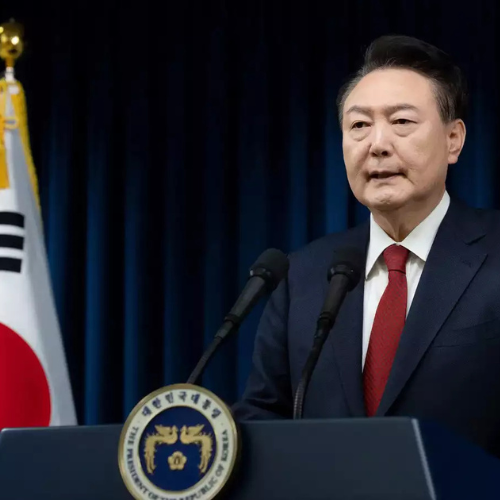North Korea has strongly criticized South Korea’s brief implementation of martial law, calling it a sign of a “fascist dictatorship.” The statement came after South Korean President Yoon Suk Yeol declared martial law on December 3, a move that sparked widespread upheaval and concerns both within and outside the country.
North Korean state media described the situation as “chaos” and accused President Yoon of showing his “true authoritarian colors” by suspending civilian rule. According to North Korea’s commentary, the imposition of martial law was a desperate attempt to cling to power amid political turmoil and mounting calls for Yoon’s impeachment. The statement also suggested that Yoon’s actions had tarnished South Korea’s reputation as a stable democracy, with the international community closely observing the unrest.
The martial law declaration involved deploying special forces and helicopters to the South Korean parliament. Although it was quickly rescinded after lawmakers opposed it, the incident left deep marks on the nation’s political landscape.
Internal Chaos and Allegations of Misconduct
South Korea’s brief but controversial period of martial law has drawn attention to a series of internal political struggles. President Yoon claimed the decree was necessary to protect South Korea from “communist threats” and “anti-state elements” that he argued endangered national security and freedom. However, opposition lawmakers and commentators saw this move differently, describing it as reckless and authoritarian.
Impeachment Looms: South Korea’s Political Crisis Deepens
Former defense officials also faced accusations of escalating tensions with North Korea to justify martial law. One such official was arrested on December 5 for reportedly ordering drone operations near Pyongyang and calling for strikes on North Korean launch sites. These alleged actions were seen as deliberate provocations aimed at creating a pretext for declaring martial law.
Protests erupted across South Korea in response to the government’s actions, with tens of thousands of citizens braving freezing weather to demand Yoon’s resignation. Many South Koreans expressed fears about the country’s political stability and the possible erosion of democratic principles. While Yoon survived an initial impeachment vote on December 9, opposition parties have vowed to bring another motion to parliament soon.
Growing Tensions Between the Two Koreas
Relations between North and South Korea have been especially strained in recent months, making the martial law incident even more controversial. North Korea has increased its missile tests, violating United Nations sanctions, and launched balloons carrying trash into South Korea as an act of retaliation for propaganda leaflets sent by activists across the border. These actions have fueled anger and mutual distrust between the two nations.
Iran’s Bank Mellat Takes Bank of Korea to Court Over Alleged $69M Loss
North Korea’s response to the martial law declaration was unusually sharp. Its state media called it evidence of South Korea’s internal fragility and warned of “grave consequences” for the South’s governance and democracy. Analysts suggest that Pyongyang is carefully monitoring the situation, especially as it navigates its own political and military challenges, including its controversial support for Russia in the Ukraine conflict.
Experts believe North Korea’s leaders may be treading cautiously to avoid any spillover effects of South Korea’s political crisis on their own military and governance. Reports indicate that a significant number of North Korean troops have been deployed to assist Russia, potentially limiting the regime’s ability to escalate tensions further with South Korea.
The international community is also closely watching developments in the Korean Peninsula. The martial law episode has raised concerns about South Korea’s political stability, a critical factor given its role as a key U.S. ally in East Asia and its proximity to the increasingly volatile North Korean regime.
While the martial law declaration has been rescinded, the fallout continues to dominate South Korean politics and relations between the two Koreas. For now, the region remains on edge as tensions show no signs of easing.


